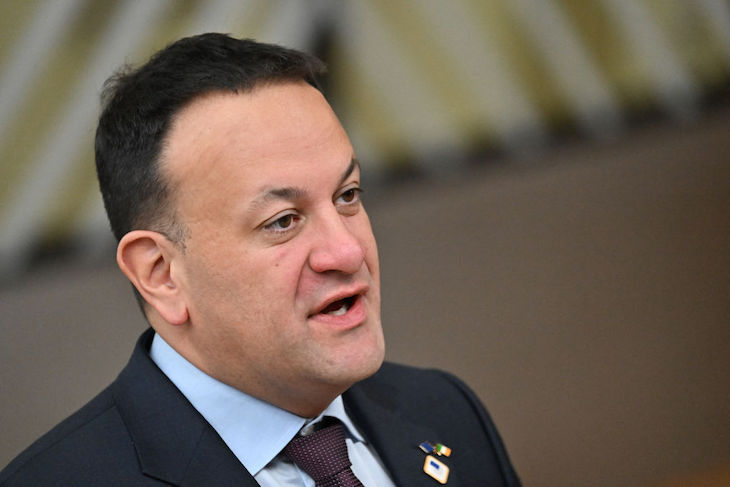Christmas is a time when those who are closest to each other fight most bitterly. Ireland, which is bringing a legal case against the UK under the European Convention on Human Rights (ECHR), appears to be acting in the spirit of the season.
The country’s deputy prime minister Micheál Martin announced yesterday that his government intended to challenge the provisions of the Northern Ireland Troubles (Legacy and Reconciliation) Act 2023 at the European court in Strasbourg. The Taoiseach, Leo Varadkar, framed his government’s intervention in particularly provocative terms.
‘We did make a commitment to survivors in Northern Ireland and to the families of victims that we would stand by them,’ he said. But this idea of the government in Dublin as some kind of guardian angel is utterly obnoxious; it would be interesting to know how deep its commitment to the victims of Republican violence runs, given that they made up the majority of deaths during the Troubles.
No wonder the coalition parties want to polish their anti-British credentials
It’s true that the legislation is not particularly well conceived. Granted Royal Assent in September, it attempts to address historical issues of the conflict in Northern Ireland: it sets limitations on criminal investigations, legal proceedings, inquests and police complaints and balances this by establishing an Independent Commission for Reconciliation and Information Recovery and making provision for the experiences of victims to be recorded and preserved.
Effectively, it is an attempt to draw a line under some of the most bitter disputes and accusations and to help Northern Ireland as a society move on. The model which ministers have pointed to is South Africa’s Truth and Reconciliation Commission, created in 1996 after the dismantling of the apartheid regime, which rejected punitive justice for ‘bearing witness’ to the crimes and injustices of the apartheid era.
While the Troubles Act was welcomed by veterans’ groups, as it offered the reassurance of immunity from prosecution for former members of the security forces, victims’ groups argued that it would prevent them from seeking justice; the commissioner for victims and survivors, Ian Jeffers, described it as ‘a very bitter pill to swallow’. It also achieved the unusual distinction of uniting Sinn Féin, the Democratic Unionist Party and the other major parties at Stormont in opposition.
However bad or unpopular the act may be, however, it is a piece of domestic legislation, considered and passed by the UK Parliament to apply within the UK. Martin criticised the decision of the UK government to ‘pursue legislation unilaterally’; but he appears to be forgetting that, within its own jurisdiction, Westminster is within its rights to do just that.
Ireland’s government also appears to be turning a blind eye to something else: the long and consistent pattern of sympathy towards Republican terrorists in the country. Convicted IRA bomber Gerry Kelly said he was sheltered by leading supporters of both Fianna Fáil and Fine Gael after he escaped from the Maze prison in 1983; five years later, taoiseach Charles Haughey refused to extradite the defrocked Catholic priest Patrick Ryan, suspected (accurately) of assisting the IRA in its bomb-making. Events like these leave a sour taste in unionist mouths.
Micheál Martin has argued that the Belfast Agreement stipulates that the ECHR must be observed and that he has been advised the act infringes this law. But then-secretary of state for Northern Ireland, Brandon Lewis, had no hesitation in making the required declaration when the bill was first introduced in May 2022 that it was compatible with the UK’s obligations under the ECHR. Why Dublin’s advice should be any superior to London’s is not clear.
Perhaps the answer is that this challenge from Dublin is a political intervention. It is the worst form of pious cant for Varadkar or Martin to pretend otherwise. The three-party coalition government which was formed by Fianna Fáil, Fine Gael and the Green party in June 2020 must face the electorate again by March 2025, and its leaders are acutely aware that their parties have lagged increasingly far behind Sinn Féin for almost three years. No wonder the coalition parties want to polish their anti-British credentials and pretend that the articles of the Irish constitution which claimed to ‘exercise jurisdiction’ over ‘the whole island of Ireland, its islands and the territorial seas’ had not been repealed in 1998.
Northern Ireland secretary Chris Heaton-Harris has criticised the Irish government’s decision to intervene, noting that Dublin has not engaged with the Independent Commission for Reconciliation & Information Recovery led by Sir Declan Morgan KC. He also observed that the Irish government has made no effort since 1998 to pursue prosecutions for past offences over which it might have jurisdiction.
Tánaiste Martin claims he and his colleagues ‘find ourselves in a space where our only recourse is to pursue a legal path’. Unionists will with good reason contest that plea of ‘you made me do it’. The Belfast Agreement recognises ‘the Irish government’s special interest in Northern Ireland’, and provides a number of forums in which Dublin is to be involved and consulted. But for the Irish government to portray itself so explicitly as a party to domestic UK legislation, especially wearing the dubious cloak of the champion of victims, is offensive interference. This was a conscious and political rather than legal decision in Dublin: the Irish government should, as they say in Belfast, wind its neck in.







Comments